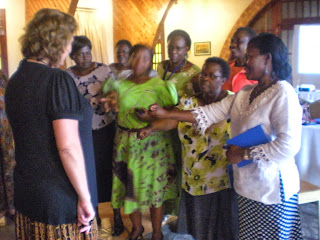 |
| Add caption |
So our workshop finished yesterday with the sound of
singing. There is nothing quite like
African voices raising the roof and the song was our GMTP anthem, developed
originally for the RCM staff conference back in July.
It’s a round in three
parts with words about the need for more midwives across the world (written
with help from my creative husband), set to a hymn tune I first learned from American
Mennonites in Cambodia!
The words to the song are:
1.
Worldwide midwives far too few, worldwide
midwives far too few.
2.
Twinning, training, building capacity, changing
lives
3.
Education, regulation and association.
Follow this link to listen to a recording
http://www.youtube.com/watch?v=W1LD-gOlrpU.
According to the State of the World’s midwifery Report
(UNFPA, 2011
http://www.unfpa.org/sowmy/report/home.html)
there is a global shortage of three hundred and fifty thousand skilled midwives. Three hundred thousand women die in
childbirth each year and more than thirty times that number suffer long-term
damage to their health and well-being. Women have a right to good quality, accessible
maternity care. Investing in midwives
makes sense and yet
the 58 countries with 91% of global maternal deaths have less than 17% of the world's midwifery workforce. The International Confederation of Midwives states that effective
midwifery regulation, good quality midwifery education and a strong
professional midwifery association are the keys to a strong midwifery
profession. Our Global Midwifery
Twinning Project focuses on these three areas, working alongside the midwifery associations
in Cambodia, Nepal and Uganda. Working with organisations and bureaucracy can be
frustrating. However, in our workshop we
were reminded of an African Proverb:
‘If you want to go fast, go
alone.
If you want to go far, go
together’.
Twinning can be frustrating, but working together – even if
slow – will surely make a difference in the long term. Florence, Head of the Midwifery Chapter of
the Uganda Nurses and Midwives Union, encouraged us to persevere, through the
words of another African midwifery anthem:
“I will never give up until
things are done.
I will never give up until God
says ‘Well Done’.”
 |
| Mary, President of UMPA; Me; Florence, Head of Midwifery Chapter of Uganda Nurses and Midwives Union |
One of the key advocacy messages highlighted at the workshop
was the need for more male involvement around reproductive health in
Uganda. Robina, National Coordinator for
the White Ribbon Alliance in Uganda reminded us that women are dying because
society has not decided that their lives are worth saving. The workshop helped
UPMA to develop a clear action plan to target local community leaders,
developing ‘model districts’ where men value women’s reproductive health rights
and ensure that barriers preventing access to good quality services are broken
down.
 |
| Robina, National Coordinator for the White Ribbon Alliance in Uganda |
Sarah, a midwife and politician, ended the conference with
the inspiring thought that one life saved has huge impact. Another African proverb: ‘sticks collected
one by one make a bundle’.
 |
| Sarah, Midwife and Politician who officially opened and closed our conference - and participated in many of the discussions |
The challenge for UPMA, and the Global Midwifery Twinning
Project, is to ensure that the energy and momentum generated by the workshop
will be continued for the next 18 months and beyond. Putting firm plans in place for this will be
the focus of my remaining time in Uganda.
I’ll finish this blog with some words from Elizabeth, a
senior midwifery lecturer from Mokono University who I interviewed this
morning:
 |
| Elizabeth |
‘Surely if we follow up these messages and the activities
planned the voice of midwives will be heard.
Sometimes I feel we must have faith in the little people. I don’t despise
small beginnings. Midwives have standing
and connections in their communities; investing in them has great potential for
impact. The GMTP project has made UPMA midwives
visible and given them recognition. For
me personally, my interaction with the GMTP volunteers has given me more skills
and knowledge and the confidence to move forward as the leader of our
Masters in Midwifery programme. GMTP has
also connected me with midwives and others, allowing me to grow socially and understand
the bigger picture of midwifery. I am grateful for the opportunity to
participate in the project.’





















































